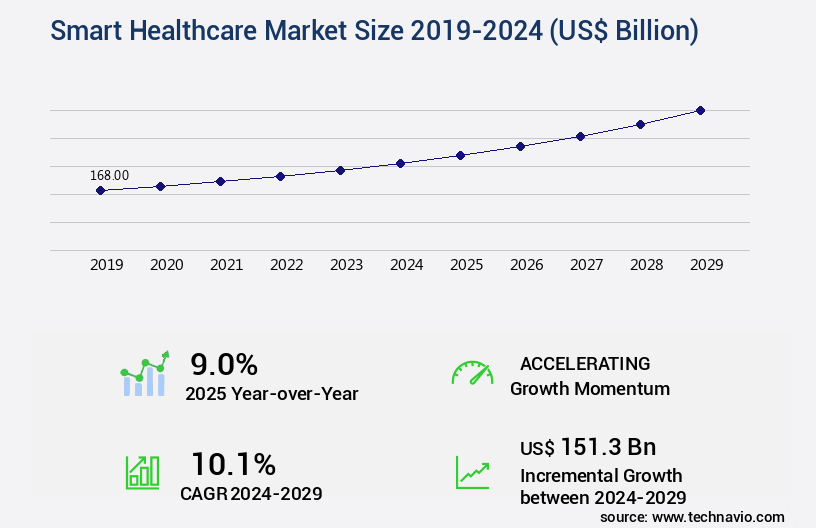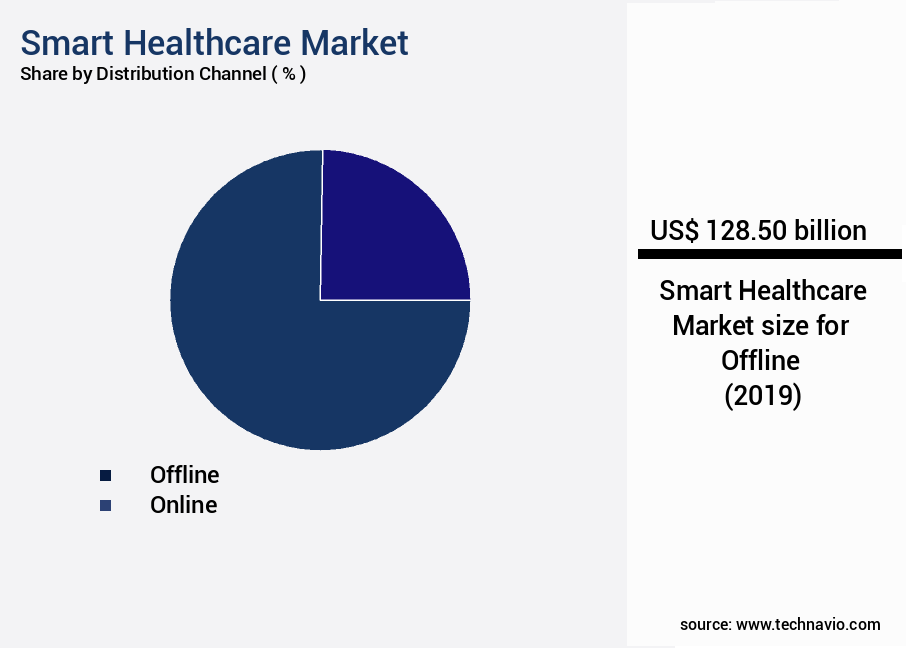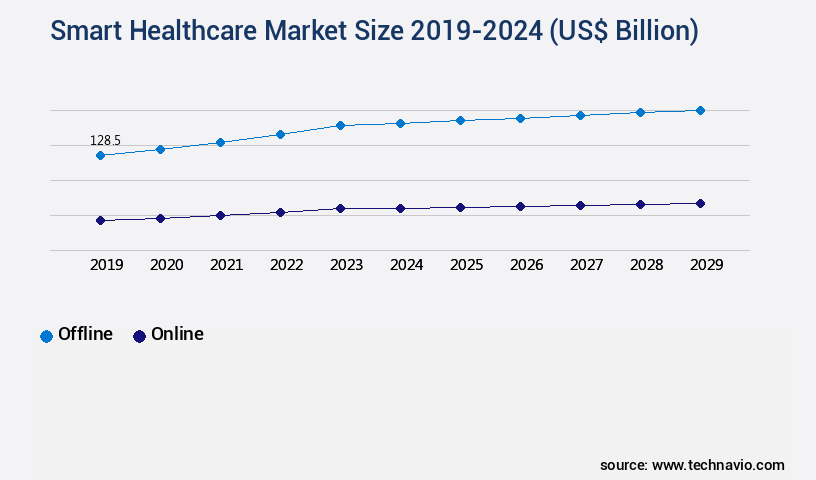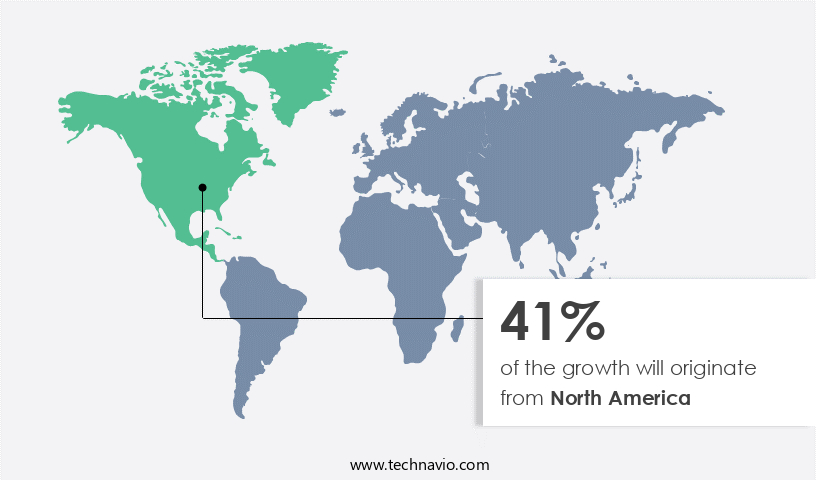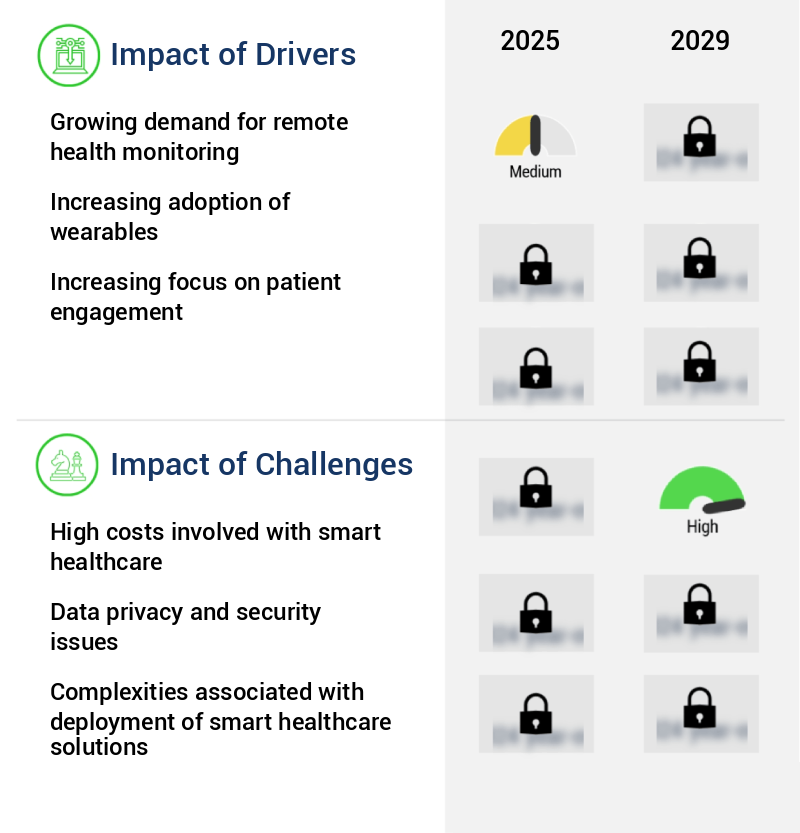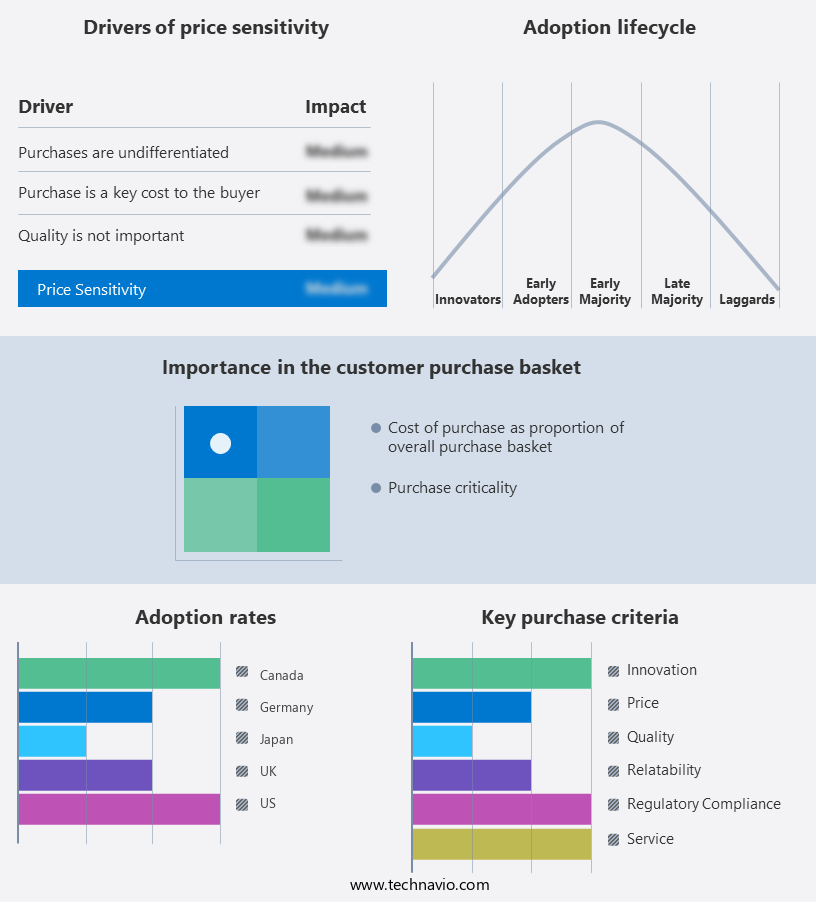Smart Healthcare Market Size 2025-2029
The smart healthcare market size is forecast to increase by USD 151.3 billion, at a CAGR of 10.1% between 2024 and 2029.
- The market represents a significant and continually evolving sector, characterized by the integration of technology into healthcare delivery and management. This market encompasses various applications, including telehealth, remote patient monitoring, electronic health records, and medical equipment with advanced capabilities. One of the primary drivers fueling the growth of the market is the increasing demand for remote health monitoring. This trend is particularly relevant in today's world, where social distancing measures have become a necessity. Remote patient monitoring enables healthcare providers to assess and manage patients' health conditions from a distance, reducing the need for in-person visits and minimizing potential exposure to infectious diseases.
- Despite the numerous benefits, the market faces challenges, primarily due to the high costs associated with implementing and maintaining these advanced technologies. Nevertheless, the potential for improved patient outcomes, increased efficiency, and enhanced patient satisfaction makes the investment worthwhile for many healthcare organizations. Comparing the growth rates of different applications within the market, telehealth has experienced a remarkable surge in adoption. In 2020, the number of telehealth visits in the US increased by approximately 50% compared to the previous year. This trend is expected to continue, with telehealth expected to account for 25% of all healthcare visits by 2025.
- In conclusion, the market represents a dynamic and evolving sector, characterized by the integration of technology into healthcare delivery and management. The market faces challenges, such as high costs, but also offers significant benefits, including improved remote patient outcomes, increased efficiency, and enhanced patient satisfaction. Applications like telehealth are experiencing rapid growth, with telehealth visits expected to account for a quarter of all healthcare visits by 2025.
Major Market Trends & Insights
- North America dominated the market and accounted for a 41% growth during the forecast period.
- The market is expected to grow significantly in Europe as well over the forecast period.
- By the Distribution Channel, the Offline sub-segment was valued at USD 128.50 billion in 2023
- By the Solution, the Telemedicine sub-segment accounted for the largest market revenue share in 2023
Market Size & Forecast
- Market Opportunities: USD 135.06 billion
- Future Opportunities: USD 151.30 billion
- CAGR : 10.1%
- North America: Largest market in 2023
What will be the Size of the Smart Healthcare Market during the forecast period?
Get Key Insights on Market Forecast (PDF) Request Free Sample
- The market encompasses various technologies and services that enhance preventive healthcare measures, facilitate health information privacy, and promote value-based healthcare. According to recent estimates, over 30% of the global healthcare expenditure is allocated to chronic disease management. This sector is anticipated to expand by approximately 15% annually, driven by the integration of advanced technologies such as remote diagnostics tools, genomic data analysis, and patient portal systems. Moreover, the adoption of personalized treatment plans, medical device cybersecurity, and clinical decision support systems has significantly improved patient outcomes and reduced healthcare costs. For instance, the implementation of telehealth infrastructure and wearable sensor data has led to a 10% decrease in hospital readmissions and a 20% increase in patient engagement.
- Additionally, the digital health ecosystem, including mobile health apps, health information technology, and connected medical devices, has streamlined clinical trial data collection and the drug development process. In contrast, the healthcare industry continues to face challenges in patient safety protocols, medical device regulation, and pharmaceutical informatics. Despite these hurdles, the market's growth is propelled by the potential for enhanced patient experiences, improved clinical decision making, and increased efficiency in healthcare delivery.
How is this Smart Healthcare Industry segmented?
The smart healthcare industry research report provides comprehensive data (region-wise segment analysis), with forecasts and estimates in "USD billion" for the period 2025-2029, as well as historical data from 2019-2023 for the following segments.
- Distribution Channel
- Offline
- Online
- Solution
- Telemedicine
- mHealth
- EHR
- Smart pills
- Others
- End-user
- Hospitals
- Home healthcare
- Specialty clinics
- Diagnostic centers
- Geography
- North America
- US
- Canada
- Europe
- France
- Germany
- Italy
- Spain
- UK
- Middle East and Africa
- South Africa
- UAE
- South America
- Brazil
- Rest of World (ROW)
- North America
By Distribution Channel Insights
The offline segment is estimated to witness significant growth during the forecast period.
In the dynamic and evolving the market, various sectors intersect to deliver advanced solutions that cater to diverse healthcare needs. Cloud-based health systems facilitate seamless data sharing and accessibility, enabling AI-powered diagnostics and medical image processing. Home healthcare solutions, integrated with virtual physician assistants, augmented reality surgery, and telemedicine platforms, offer remote patient monitoring and personalized medicine programs. The market's growth is underpinned by the adoption of wearable health sensors, medical device integration, and health data interoperability. Precision oncology treatment, disease surveillance systems, mental health platforms, and genomic sequencing services are transforming healthcare delivery. Blockchain healthcare, digital therapeutics, and population health management are emerging trends, driving industry growth.
The Offline segment was valued at USD 128.50 billion in 2019 and showed a gradual increase during the forecast period.
According to recent reports, approximately 30% of hospitals worldwide have adopted telemedicine platforms, and this number is projected to increase significantly. Furthermore, the market for wearable health sensors is expected to expand at a substantial rate, reaching over 50% annual growth in the next few years. These trends underscore the market's continuous evolution and the potential for significant opportunities in the smart healthcare sector.
Regional Analysis
North America is estimated to contribute 41% to the growth of the global market during the forecast period.Technavio's analysts have elaborately explained the regional trends and drivers that shape the market during the forecast period.
See How Smart Healthcare Market Demand is Rising in North America Request Free Sample
The market in North America is projected to lead the global market expansion during the forecast period, with the US being the primary contributor to the region's revenue. Factors such as growing awareness, expanding mobile coverage, and increasing prevalence of chronic diseases are driving the market growth in North America. In the US, hospitals are well-equipped to adopt advanced technologies like smart pills, smart cabinets, and mHealth services. Furthermore, the increasing purchasing power of adults and youth is fueling the adoption of smart healthcare devices. According to recent studies, The market is anticipated to grow by approximately 15% within the next five years.
This growth is attributed to the increasing adoption of digital health technologies, rising healthcare expenditures, and the growing geriatric population. In comparison, the market in Europe is expected to witness a growth rate slightly lower than the global average, primarily due to the maturity of the healthcare sector in the region. The Asia Pacific market, on the other hand, is anticipated to experience significant growth during the forecast period, driven by the increasing healthcare expenditures, growing awareness, and the large population base in countries like China and India. The market in the Middle East and Africa is expected to grow at a moderate pace due to the limited healthcare infrastructure and low healthcare spending in the region.
In conclusion, The market is experiencing significant growth, with North America and Asia Pacific being the major contributors. The adoption of digital health technologies, increasing healthcare expenditures, and demographic factors are key drivers of market growth.
Market Dynamics
Our researchers analyzed the data with 2024 as the base year, along with the key drivers, trends, and challenges. A holistic analysis of drivers will help companies refine their marketing strategies to gain a competitive advantage.
The global healthcare technology market is undergoing continuous transformation as digital solutions reshape how care is delivered, managed, and optimized. The integration of EHR and PHR systems, along with the deployment of cloud based healthcare systems, is strengthening data accessibility while addressing challenges of health data interoperability. Growing adoption of telehealth solutions in rural areas and the implementation of remote patient monitoring highlight the expanding role of connected platforms in extending access to care and improving patient outcomes. At the same time, cybersecurity threats in telehealth are pushing organizations to strengthen application of blockchain in healthcare data security and deploy stronger data security protocols.
Quantitative assessments underscore the pace of change. Telehealth adoption grew from 28% of patients in 2020 to 46% in 2023, reflecting a clear acceleration in acceptance of digital care delivery. Similarly, the market for ai algorithms for disease prediction is projected to grow at an annual rate of 19%, outpacing the 12% growth rate of data analytics for population health management, showing stronger near-term momentum in AI-driven clinical applications compared to broader analytics-driven approaches.
Innovation is also reshaping care pathways. The effectiveness of virtual reality therapy is being validated in both physical and mental health settings, while development of virtual reality for surgical training supports clinical workforce readiness. Benefits of personalized medicine approaches, combined with adherence to medication using digital tools, are improving patient engagement through mobile apps and wearable sensors. These advancements, supported by clinical trial recruitment optimization and the role of AI in diagnostic imaging, illustrate how healthcare technology is advancing toward more personalized, predictive, and preventive models of care.
What are the key market drivers leading to the rise in the adoption of Smart Healthcare Industry?
- The increasing need for remote health monitoring is the primary market driver, as this approach enables continuous patient monitoring from a distance, enhancing healthcare efficiency and delivering improved patient outcomes.
- The market has experienced significant growth in recent years due to the increasing demand for effective healthcare monitoring solutions, particularly for the elderly population in developed regions. Chronic diseases, such as diabetes, cancer, arthritis, obesity, asthma, and heart disease, have become prevalent as life expectancy increases. In response, there has been a surge in the adoption of smart healthcare solutions that utilize communication and sensor technologies, along with data analysis techniques, to monitor individuals' health conditions and daily activities for accurate diagnosis and ongoing treatment. Healthcare centers have shown a growing interest in real-time healthcare monitoring, leading to the widespread implementation of smart healthcare solutions.
- These systems offer numerous advantages, including improved patient outcomes, reduced healthcare costs, and enhanced patient engagement. The integration of advanced technologies, such as artificial intelligence and machine learning, further enhances the capabilities of smart healthcare solutions, enabling more accurate diagnoses and personalized treatment plans. Moreover, the ongoing development of wearable devices and mobile applications has made it easier for individuals to access and manage their health information, fostering a more proactive approach to healthcare. The continuous evolution of smart healthcare solutions is expected to bring about further advancements, including remote patient monitoring, telemedicine, and predictive analytics, ultimately transforming the healthcare industry as we know it.
- The integration of these advanced technologies into healthcare systems has led to a substantial increase in data generation, necessitating robust data management and security measures to ensure patient privacy and data confidentiality. As the market continues to unfold, the focus on data security and interoperability will be crucial to the successful implementation and adoption of smart healthcare solutions.
What are the market trends shaping the Smart Healthcare Industry?
- In the realm of healthcare technology, the Internet of Things (IoT) is emerging as a significant market trend. IoT in healthcare signifies a notable development.
- The market is witnessing significant growth due to the integration of Internet of Things (IoT) technology in the healthcare industry. IoT infrastructure enables the collection and analysis of real-time patient data, thereby enhancing patient care and reducing operational burdens on healthcare facilities. This technology is transforming healthcare institutions into connected ecosystems, allowing for timely and improved care. The healthcare sector's adoption of IoT extends beyond medical facilities, with potential applications in remote patient monitoring, telemedicine, and wearable devices. IoT devices provide healthcare professionals with valuable insights into patients' health statuses, enabling proactive interventions and improved patient outcomes.
- Additionally, IoT technology supports the development of digital healthcare ecosystems, streamlining processes and improving overall efficiency. The integration of IoT in healthcare is a continuous and evolving process, with new applications and advancements emerging regularly. The market's growth is driven by the increasing demand for personalized and connected healthcare services, as well as the ongoing digitization of healthcare systems. The potential benefits of IoT in healthcare are vast, from improved patient care and operational efficiency to reduced costs and enhanced data security. Comparatively, the global market for connected medical devices is expected to reach a significant value by 2025, growing at a steady pace during the forecast period.
- The increasing adoption of these devices, particularly in chronic disease management and remote patient monitoring, is a major contributor to this growth. The integration of advanced technologies such as artificial intelligence (AI) and machine learning (ML) in connected medical devices further enhances their capabilities, enabling more accurate diagnoses and personalized treatment plans. In conclusion, the market is experiencing significant growth due to the integration of IoT technology and connected medical devices. This transformation is driving improvements in patient care, operational efficiency, and overall healthcare system effectiveness. The market's continuous evolution is expected to bring about new applications and advancements, making it an exciting and dynamic space for innovation and growth.
What challenges does the Smart Healthcare Industry face during its growth?
- The escalating costs associated with implementing and maintaining advanced technologies in healthcare is a significant challenge impeding the industry's growth.
- The market encompasses advanced technologies and devices that aim to enhance the efficiency and effectiveness of healthcare services. This sector is characterized by continuous innovation and evolution, with applications spanning various sectors, including telemedicine, remote patient monitoring, and electronic health records (EHR). One of the key components driving the growth of the market is the integration of advanced technologies such as biosensors and EHR systems. However, the high cost associated with these technologies poses a significant challenge to their widespread adoption. For instance, the cost of a single biosensor is substantial due to its novelty and the complexity of its manufacturing process.
- This cost is further compounded by the additional components, such as pills, fluidic sensors, flow meters, gyroscopes, and micro dispensers, which are required for the functioning of the biosensor. Similarly, the implementation of EHR systems incurs significant costs due to the need for extensive infrastructure and IT resources. Despite these challenges, the potential benefits of these technologies, such as improved patient outcomes and increased operational efficiency, make them a worthwhile investment for healthcare providers. Moreover, the ongoing development of wireless communication technologies and the increasing prevalence of smartphones and other mobile devices are expected to drive the growth of the market by enabling remote patient monitoring and telemedicine services.
- These trends, along with advancements in artificial intelligence and machine learning, are transforming the healthcare landscape and opening up new opportunities for innovation and growth. In terms of numerical data, the market for biosensors is projected to grow at a steady pace, with an increasing number of applications in various industries, including healthcare, agriculture, and food processing. Meanwhile, the EHR market is expected to continue its dominance, driven by the growing adoption of digital health services and the increasing focus on patient-centric care. Overall, the market is a dynamic and evolving sector, characterized by continuous innovation and the integration of advanced technologies. Despite the challenges posed by high costs, the potential benefits of these technologies make them a worthwhile investment for healthcare providers and a promising area for future growth.
Exclusive Customer Landscape
The smart healthcare market forecasting report includes the adoption lifecycle of the market, covering from the innovator's stage to the laggard's stage. It focuses on adoption rates in different regions based on penetration. Furthermore, the smart healthcare market report also includes key purchase criteria and drivers of price sensitivity to help companies evaluate and develop their market growth analysis strategies.
Customer Landscape of Smart Healthcare Industry
Key Companies & Market Insights
Companies are implementing various strategies, such as strategic alliances, smart healthcare market forecast, partnerships, mergers and acquisitions, geographical expansion, and product/service launches, to enhance their presence in the industry.
Abbott Laboratories - This company leads in innovative healthcare solutions, including the FreeStyle Libre continuous glucose monitoring system, Alinity diagnostic systems, and ID NOW point-of-care testing platform. These advanced technologies enhance patient care and diagnostic accuracy.
The industry research and growth report includes detailed analyses of the competitive landscape of the market and information about key companies, including:
- Abbott Laboratories
- Altera Digital Health Inc
- Apple Inc.
- athenahealth Inc.
- Cisco Systems Inc.
- F. Hoffmann La Roche Ltd.
- GE Healthcare Technologies Inc.
- Hewlett Packard Enterprise Co.
- Honeywell International Inc.
- Huawei Technologies Co. Ltd.
- International Business Machines Corp.
- Johnson and Johnson Services Inc.
- Koninklijke Philips NV
- Medtronic Plc
- Microsoft Corp.
- Olympus Corp.
- Oracle Corp.
- Samsung Electronics Co. Ltd.
- Verily
- Zebra Technologies Corp.
Qualitative and quantitative analysis of companies has been conducted to help clients understand the wider business environment as well as the strengths and weaknesses of key industry players. Data is qualitatively analyzed to categorize companies as pure play, category-focused, industry-focused, and diversified; it is quantitatively analyzed to categorize companies as dominant, leading, strong, tentative, and weak.
Recent Development and News in Smart Healthcare Market
- In January 2024, Medtronic, a leading medical technology company, announced the FDA approval of its new remote patient monitoring system, "Guardian Connect," which uses continuous glucose monitoring and insulin delivery for diabetes management (Medtronic Press Release, 2024).
- In March 2024, IBM Watson Health and Google Cloud entered into a strategic partnership to combine IBM Watson's AI and machine learning capabilities with Google Cloud's healthcare data analytics platform, aiming to improve patient outcomes and population health management (IBM Watson Health, 2024).
- In May 2024, Teladoc Health, a telehealth provider, raised USD1.1 billion in an initial public offering (IPO), marking the largest healthcare IPO since 2013, signaling growing investor interest in the telehealth sector (Reuters, 2024).
- In February 2025, the European Commission approved the merger of Philips and Signify, creating a new entity focused on healthcare technology and consumer electronics, with a combined market capitalization of €25 billion (European Commission, 2025). This merger is expected to strengthen Philips' position in the market.
Research Analyst Overview
- The market encompasses a dynamic and evolving landscape, driven by the integration of advanced technologies to enhance healthcare delivery and patient outcomes. This market includes various applications, such as cloud-based health systems, home healthcare solutions, and AI-powered diagnostics, among others. Cloud-based health systems enable secure access to electronic health records (EHRs) and facilitate interoperability between different healthcare providers, improving patient care coordination. Home healthcare solutions, including remote monitoring devices and virtual physician assistants, enable care delivery beyond traditional hospital settings, enhancing patient convenience and reducing healthcare costs. AI-powered diagnostics and medical image processing systems offer improved accuracy and efficiency in disease detection and diagnosis, while virtual reality therapy and digital therapeutics cater to mental health needs.
- Precision oncology treatment and genomic sequencing services offer personalized treatment plans based on individual patient genetic information. Moreover, population health management, disease surveillance systems, and telemedicine platforms enable proactive care and early intervention, reducing healthcare costs and improving patient outcomes. Blockchain healthcare and health data interoperability ensure secure data sharing and access, while drug discovery platforms and clinical trial management systems accelerate new treatments and therapies. For instance, the remote patient monitoring market alone is projected to reach USD317.2 billion by 2026.
- These trends reflect the ongoing transformation of healthcare, as technology continues to reshape the industry and improve patient care. In conclusion, the market represents a dynamic and evolving landscape, driven by the integration of advanced technologies to enhance healthcare delivery and patient outcomes. From cloud-based health systems and home healthcare solutions to AI-powered diagnostics and telemedicine platforms, the market offers numerous applications that cater to diverse healthcare needs. With continued innovation and investment, the market is poised for significant growth and transformation in the coming years.
Dive into Technavio's robust research methodology, blending expert interviews, extensive data synthesis, and validated models for unparalleled Smart Healthcare Market insights. See full methodology.
|
Market Scope |
|
|
Report Coverage |
Details |
|
Page number |
236 |
|
Base year |
2024 |
|
Historic period |
2019-2023 |
|
Forecast period |
2025-2029 |
|
Growth momentum & CAGR |
Accelerate at a CAGR of 10.1% |
|
Market growth 2025-2029 |
USD 151.3 billion |
|
Market structure |
Fragmented |
|
YoY growth 2024-2025(%) |
9.0 |
|
Key countries |
US, Germany, UK, France, Italy, Brazil, Canada, UAE, Spain, and South Africa |
|
Competitive landscape |
Leading Companies, Market Positioning of Companies, Competitive Strategies, and Industry Risks |
What are the Key Data Covered in this Smart Healthcare Market Research and Growth Report?
- CAGR of the Smart Healthcare industry during the forecast period
- Detailed information on factors that will drive the growth and forecasting between 2025 and 2029
- Precise estimation of the size of the market and its contribution of the industry in focus to the parent market
- Accurate predictions about upcoming growth and trends and changes in consumer behaviour
- Growth of the market across North America, Europe, Asia, and Rest of World (ROW)
- Thorough analysis of the market's competitive landscape and detailed information about companies
- Comprehensive analysis of factors that will challenge the smart healthcare market growth of industry companies
We can help! Our analysts can customize this smart healthcare market research report to meet your requirements.

